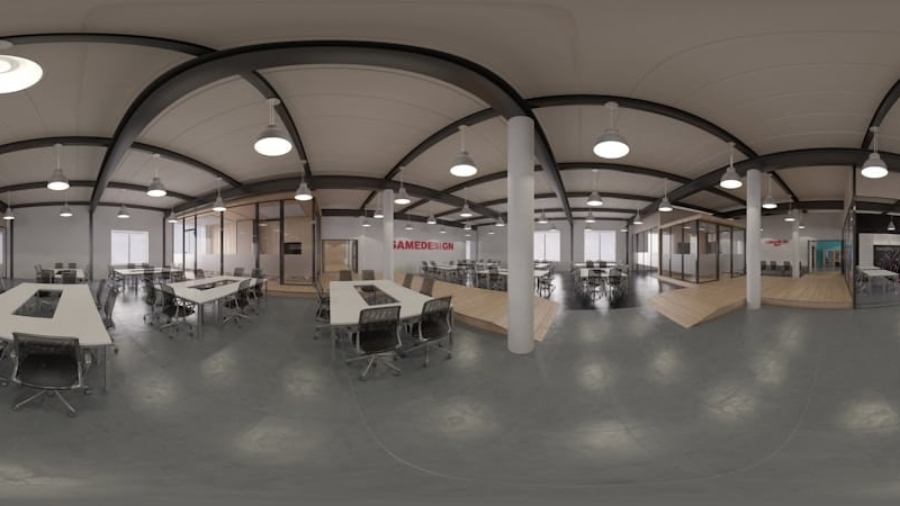The concept of the Metaverse has evolved from a niche idea in science fiction to a tangible reality that is reshaping various sectors, including corporate learning and training. Initially popularized by novels such as Neal Stephenson’s “Snow Crash” and films like “The Matrix,” the Metaverse is now understood as a collective virtual space where users can interact with a computer-generated environment and other users in real-time. This immersive digital universe encompasses augmented reality (AR), virtual reality (VR), and the internet, creating a seamless blend of physical and digital experiences.
As technology advances, the Metaverse is becoming increasingly accessible, offering organizations innovative ways to engage employees and enhance learning outcomes. In the corporate landscape, the Metaverse presents a unique opportunity to revolutionize traditional training methods. With the rise of remote work and the need for flexible learning solutions, businesses are exploring how this virtual environment can facilitate more effective training programs.
The Metaverse allows for interactive simulations, gamified learning experiences, and collaborative environments that can significantly enhance knowledge retention and skill acquisition. As organizations seek to adapt to the changing dynamics of the workforce, understanding the potential of the Metaverse in corporate learning becomes essential.
Key Takeaways
- The Metaverse is a virtual reality space where users can interact with a computer-generated environment and other users.
- The Metaverse has the potential to revolutionize corporate learning and training by providing immersive and interactive experiences.
- Immersive learning experiences in the Metaverse can enhance engagement and retention of information for corporate learners.
- Collaboration and communication in the Metaverse can facilitate teamwork and knowledge sharing among employees.
- Customized training programs in the Metaverse can be tailored to individual learning styles and needs, leading to more effective learning outcomes.
The Role of the Metaverse in Corporate Learning and Training
The Metaverse serves as a transformative platform for corporate learning and training by providing immersive environments that foster engagement and interactivity. Traditional training methods often rely on passive learning techniques, such as lectures or e-learning modules, which can lead to disengagement and limited retention of information. In contrast, the Metaverse enables organizations to create dynamic training experiences that captivate employees’ attention and encourage active participation.
For instance, companies can design virtual simulations that replicate real-world scenarios, allowing employees to practice skills in a safe and controlled environment. Moreover, the Metaverse facilitates personalized learning experiences tailored to individual employee needs. By leveraging data analytics and artificial intelligence, organizations can assess employees’ strengths and weaknesses, enabling them to create customized training paths.
This adaptability not only enhances the learning experience but also ensures that employees acquire the necessary skills to excel in their roles. As businesses continue to navigate an increasingly complex landscape, the ability to provide targeted training solutions through the Metaverse becomes a critical advantage.
Immersive Learning Experiences in the Metaverse

Immersive learning experiences are at the heart of what makes the Metaverse a powerful tool for corporate training. By utilizing VR and AR technologies, organizations can transport employees into lifelike scenarios that mimic their work environments. For example, a manufacturing company might use VR simulations to train employees on operating complex machinery without the risks associated with real-life training.
This hands-on approach not only enhances skill development but also builds confidence among employees as they become familiar with their tasks in a virtual setting. Additionally, immersive learning experiences can cater to various learning styles, accommodating visual, auditory, and kinesthetic learners alike. In a virtual classroom, employees can engage with interactive content, participate in group discussions, and collaborate on projects in real-time.
As employees navigate these immersive environments, they are more likely to retain information and apply it effectively in their daily work.
Collaboration and Communication in the Metaverse
Collaboration is a cornerstone of effective corporate training, and the Metaverse offers unique tools to enhance communication among employees. In traditional settings, team members may struggle to connect due to geographical barriers or time constraints. However, the Metaverse breaks down these obstacles by providing a shared virtual space where individuals can interact seamlessly, regardless of their physical location.
This capability is particularly valuable for organizations with remote or distributed teams, as it fosters a sense of community and belonging among employees. In the Metaverse, collaboration can take many forms, from virtual brainstorming sessions to interactive workshops. Employees can gather in digital meeting rooms equipped with tools that facilitate real-time collaboration on projects or problem-solving exercises.
For instance, a marketing team might use a virtual whiteboard to brainstorm campaign ideas while simultaneously accessing relevant data and resources. This level of interactivity not only enhances creativity but also encourages diverse perspectives, leading to more innovative solutions.
Customized Training Programs in the Metaverse
One of the most significant advantages of utilizing the Metaverse for corporate training is the ability to create customized training programs that cater to individual employee needs. Traditional training often adopts a one-size-fits-all approach, which may not address the specific challenges faced by different employees or departments. In contrast, the Metaverse allows organizations to leverage data analytics to identify skill gaps and tailor training content accordingly.
For example, an organization might analyze employee performance metrics to determine which skills require further development. Based on this analysis, they can design personalized training modules that focus on those specific areas. Employees can progress at their own pace, revisiting challenging concepts or advancing quickly through material they already understand.
This level of customization not only enhances engagement but also ensures that employees receive relevant training that directly impacts their performance.
The Impact of the Metaverse on Employee Engagement

Employee engagement is crucial for organizational success, as engaged employees are more productive, motivated, and committed to their work. The Metaverse has the potential to significantly enhance employee engagement by providing immersive and interactive learning experiences that capture attention and foster enthusiasm for professional development. When employees feel invested in their training process, they are more likely to take ownership of their learning journey and apply new skills effectively.
Furthermore, the social aspect of the Metaverse contributes to increased engagement levels. Employees can connect with colleagues in virtual environments, participate in team-building activities, and collaborate on projects in ways that transcend physical limitations. This sense of community fosters relationships among team members, leading to improved morale and job satisfaction.
As organizations prioritize employee engagement in their training initiatives, leveraging the Metaverse becomes an essential strategy for cultivating a motivated workforce.
Overcoming Challenges and Risks in Metaverse-based Learning
While the potential benefits of using the Metaverse for corporate learning are substantial, organizations must also navigate several challenges and risks associated with this emerging technology.
Disparities in technology access can create inequities among employees, potentially hindering overall effectiveness.
Additionally, organizations must address concerns related to data privacy and security within the Metaverse. As employees engage in virtual environments that may collect personal information or performance data, companies must implement robust security measures to protect sensitive information from breaches or misuse. Establishing clear guidelines for data usage and ensuring compliance with relevant regulations will be essential for building trust among employees as they participate in these innovative training programs.
Future Trends and Opportunities for Corporate Learning in the Metaverse
As technology continues to advance, the future of corporate learning in the Metaverse holds exciting possibilities for organizations willing to embrace this transformative approach. One emerging trend is the integration of artificial intelligence (AI) into virtual training environments. AI can enhance personalized learning experiences by analyzing employee interactions within the Metaverse and providing real-time feedback or recommendations based on individual performance.
Moreover, as more companies adopt hybrid work models, the demand for flexible training solutions will likely increase. The Metaverse offers an ideal platform for delivering engaging training experiences that accommodate both remote and in-office employees. Organizations may also explore partnerships with educational institutions or industry experts to develop specialized training content within the Metaverse, further enriching their offerings.
In conclusion, as businesses continue to adapt to an evolving workforce landscape, leveraging the Metaverse for corporate learning presents an opportunity to enhance employee engagement, collaboration, and skill development. By embracing this innovative approach, organizations can position themselves at the forefront of modern training practices while preparing their workforce for future challenges.
In a related article, Unlock a New World of Possibilities with the Samsung Galaxy Chromebook, explores how technology can enhance learning experiences in corporate settings. Just like the Metaverse is revolutionizing corporate training, the Samsung Galaxy Chromebook offers a new way for employees to access information and collaborate in a virtual environment. By leveraging the capabilities of this innovative device, companies can further enhance their training programs and provide employees with a more immersive learning experience.
FAQs
What is the metaverse?
The metaverse is a collective virtual shared space, created by the convergence of virtually enhanced physical reality and physically persistent virtual reality.
How is the metaverse enhancing corporate learning and training?
The metaverse is enhancing corporate learning and training by providing immersive and interactive environments for employees to learn and practice new skills. It allows for realistic simulations, virtual collaboration, and personalized learning experiences.
What are some examples of how the metaverse is being used for corporate learning and training?
Some examples of how the metaverse is being used for corporate learning and training include virtual reality simulations for hands-on training, virtual classrooms for remote learning, and virtual collaboration spaces for team-based projects.
What are the benefits of using the metaverse for corporate learning and training?
The benefits of using the metaverse for corporate learning and training include increased engagement and retention, cost-effective training solutions, the ability to practice real-world scenarios in a safe environment, and the opportunity for global collaboration and networking.
What are some potential challenges of implementing the metaverse for corporate learning and training?
Some potential challenges of implementing the metaverse for corporate learning and training include the initial cost of technology and infrastructure, the need for specialized skills to create and manage virtual environments, and concerns about data privacy and security.

